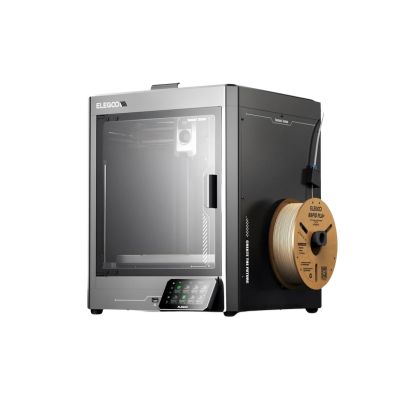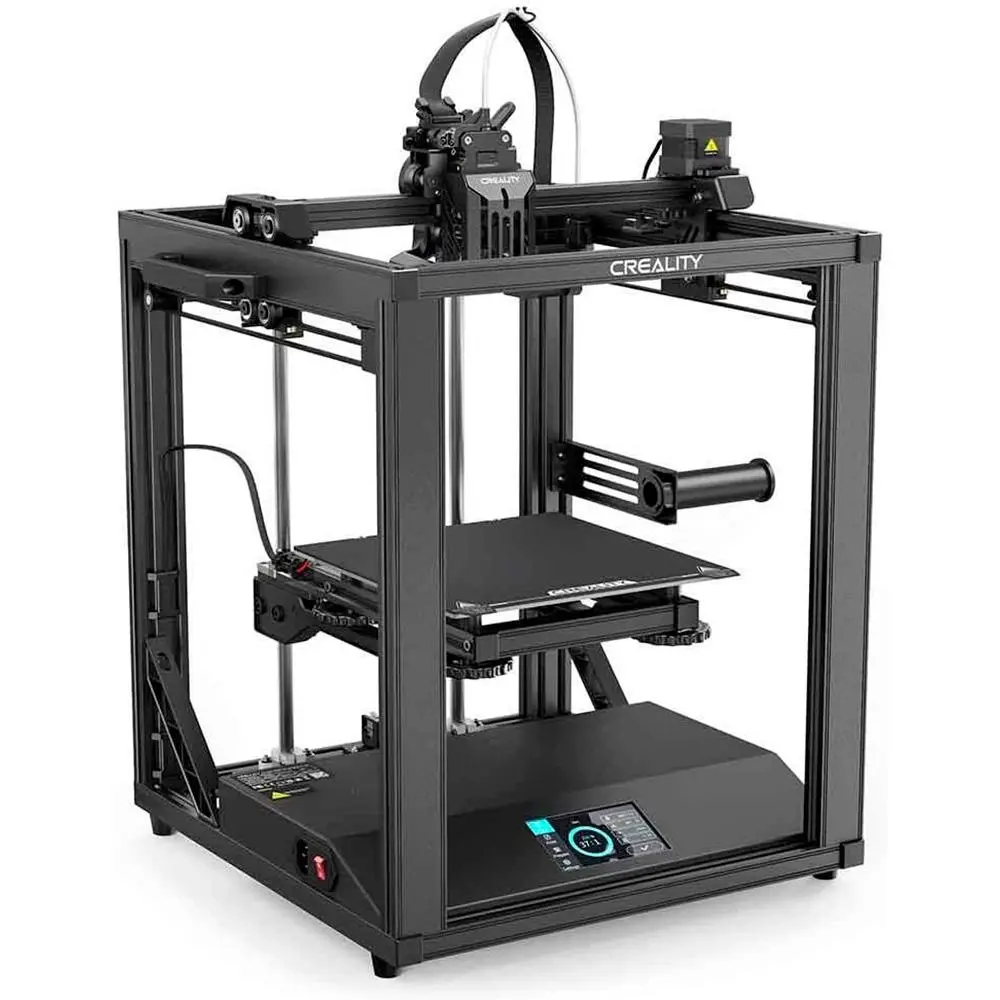Compare Centauri Carbon vs Ender 5 S1
Comparison between the best 3D printers
Choose the best 3D printer at the best price. The cheapest 3D printers are here.
Buy a 3D printer here with 3D Fila.
 |
 |
|
| Model | Centauri Carbon |
Ender 5 S1 |
| Printing Material | Filament | Filament |
| Buy Filament for Elegoo Centauri Carbon | Buy Filament forCreality 3D Ender 5 S1 | |
| Estimated price | $500,00 | $467,00 |
| Manufacturer | Elegoo | Creality 3D |
| Release Year | 2025 | 2022 |
| Print Volume [mm] | 256x256x256 | 220x220x280 |
| Printer Size [mm] | 500x500x600 | 425x460x570 |
| Weight [kg] | 17,5 | 12,1 |
| Power Loss Recovery | YES | YES |
| Enclosed printer | YES | NO |
| Bed Leveling | Automatic | Automatic |
| Filament End Sensor | YES | YES |
| Bed type | Heated | Heated |
| Power supply system | Direct Drive | Direct Drive |
| Standard nozzle | 0,4 | 0,4 |
| Maximum Nozzle Temperature [°C] | 300 | 300 |
| Maximum Bed Temperature [°C] | 110 | 110 |
| Maximum printing speed [mm/s] | 500 | 250 |
| Filament holder | YES | YES |
| Camera for supervision | YES | YES |
| Recommended filaments | PLA, PETG, ABS, ASA, TPU, NYLON, CARBON FIBER | PLA, ABS, PETG, TPU, PC, ASA, HIPS |
| Recommended slicers | Elegoo Slicer, Orca Slicer | Cura, Simplify, Slic3r, IdeaMaker |
| Maximum Resolution [mm] | 0,1 | 0,05 |
| Processor | 32 Bits | |
| Display | Touchscreen 4,3'' | Display touchscreen 4,3 '' |
| Power Supply | 350 W | 350 W |
| Connectivity | WiFi, SD, USB | SD / USB / Wi-Fi |
| Operating systems | Windows, Linux e Macbook | Windows, Mac, Linux |
| Date of registration in the system | 2025-02-10 | 2023-10-04 |
| Release date | 2025 | 2022 |
| Extra features | The Elegoo Centauri Carbon is a CoreXY 3D printer with an enclosed structure, direct drive extruder, and hardened steel components for abrasive materials. It features automatic bed leveling, a touchscreen, a filament cutting system, and an elongated nozzle designed to reduce clogs. It offers Wi-Fi connectivity for remote file transfer and runs on a Klipper-based firmware, providing advanced control and precise adjustments. | A steel drive shaft synchronizes the two Y-axis belts. High-torque 42-48 Y-axis motor for responsive and precise movement. Cartesian structure. Enhanced stability by thick linear shafts, extra stiffeners, two cantilevers, and silicone bumpers. Double Die Spring profile reinforcement. Silicone bed support. All-metal Sprite direct extruder. Best for printing with flexible filaments like TPU. Auto-calibration with 16-point CR Touch. Compatible with Sonic Pad, Wifi Box, and Camera kit. |
| Support for multiple colors and materials (AMS and CFS) | NO | NO |
Notes * |
||
| Cost-benefit | 8 / 10 | 7 / 10 |
| Hardware | 5.4 / 10 | 2.4 / 10 |
| Tela | . | . |
| Print volume | 4 / 10 | 3 / 10 |
| Performance | 4 / 10 | 2 / 10 |
Conclusion |
| In comparing the Elegoo Centauri Carbon and the Creality 3D Ender 5 S1, both 3D printers exhibit distinct strengths and weaknesses tailored to different user needs. The Elegoo Centauri Carbon edges out with a larger print volume and an enclosed structure, making it better suited for handling a wider array of filament types, especially those requiring stable environmental conditions during printing. Its automatic bed leveling, advanced connectivity options, and features designed for reduced clogging add to its appeal, particularly for users interested in high-quality, reliable prints. Conversely, the Creality 3D Ender 5 S1 offers a slightly more affordable price point and a solid build quality. While it lacks the enclosed design, it compensates with excellent performance for standard materials and a commendable maximum resolution. Its Cartesian structure is well-regarded for stability, making it a viable option for hobbyists and those new to 3D printing. Considering the overall cost-benefit ratio, the Elegoo Centauri Carbon scores higher due to its advanced features and versatility, whereas the Ender 5 S1, while less feature-rich, provides a reliable and budget-friendly option for users focused primarily on essential 3D printing capabilities. Ultimately, the choice between these two printers will depend on the user's specific needs, budget constraints, and personal preferences in print quality and material use. |

